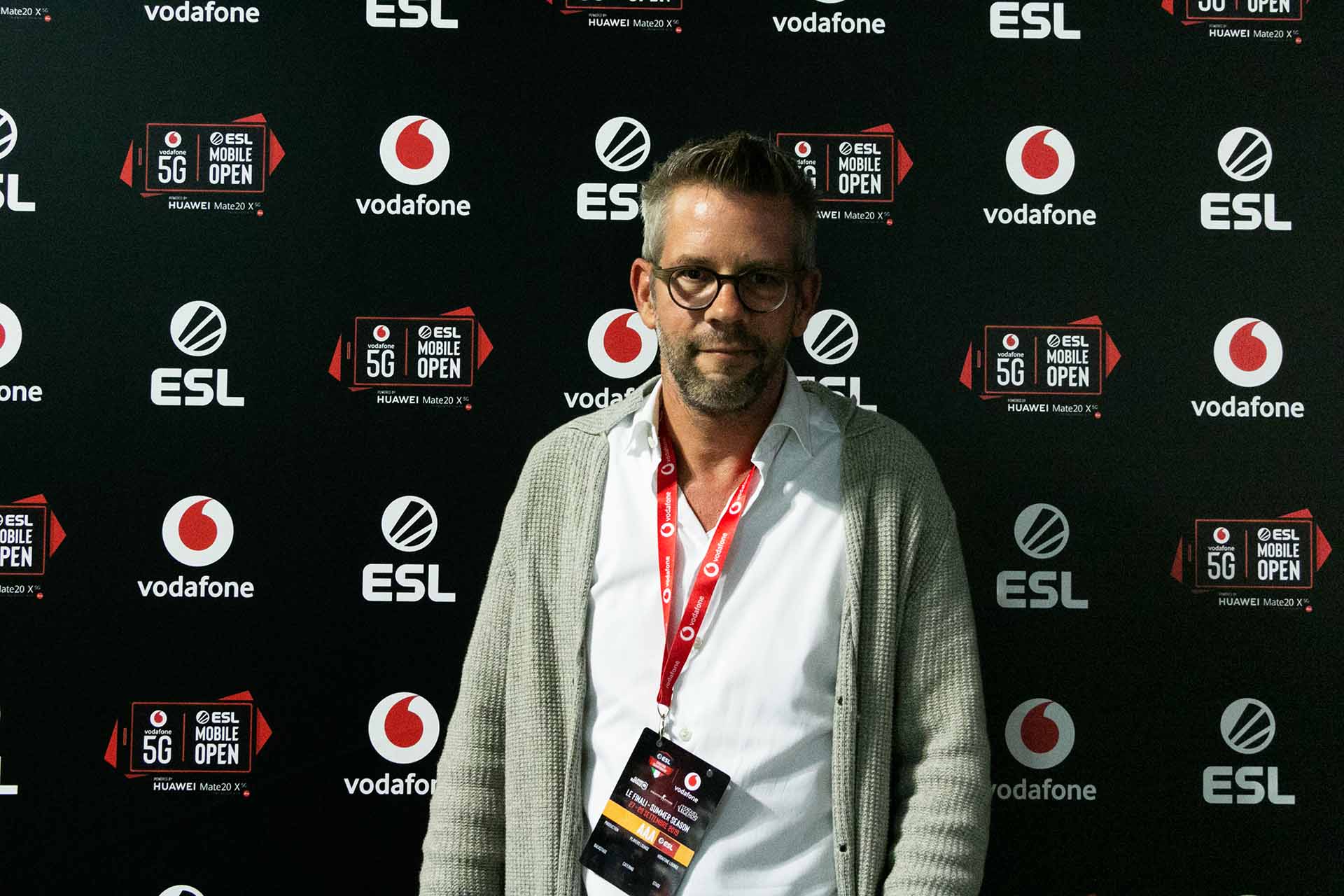The region is definitely starting to make its mark on the one of the fastest growing industries in the world, Esports, and now major Esports brands are making their way into the region.

Earlier this year at Dubai Lynx, we found out that one of the world’s biggest Esports organizations, ESL, was making its way into MENA. ESL, which develops and operates high profile, branded international leagues and tournaments, announced a partnership with broadcasting company MBC to launch ESL MENA, a new league meant to grow the local scene.
Last month, while at the world’s first ever 5G mobile Esports tournament by ESL and Vodafone Group, we sat down with ESL Chief Commercial Officer, Thomas Schmidt, to talk MENA expansion, mobile gaming and how to support gamers and Esports in the region.
- Advertisement -
TMM: ESL is incredibly famous in the international scene as one of the biggest organizers in Esports, and you’ve just started to open in MENA. How is ESL planning and expanding its reach in Middle East and Africa?
“First of all, it takes time; you can’t just bring Esports to the Middle East in 12 months so we’re looking at this with a horizon of 3 to 5 more years.
We usually start [by cultivating] the grassroots scene, then build from there to the elites essentially, but that is a job that takes 4 to 5 years really.
We have just started with the partnership with MBC, and we hope to bring some bigger events in MENA as well… we are just starting to make up our minds on how to bring Esports to that region in a more meaningful way so it’s early stages but we are quite optimistic.”
Learn more ➤ What marketers need to know about Esports in Egypt
What led to the decision to start now in MENA?
“Quite frankly, it’s quite an opportunistic decision. It’s riding the wave of Esports that is happening in the Middle East as well, so it was purely an opportunistic move to expand our presence in that region.”
ESL’s move into the region comes at a time when mostly grassroots and regional organizations promote and engage local audiences.

The gaming industry in Egypt and the MENA region continues to grow annually as well; the MENA gaming market currently makes up 2.5% of the 135 billion dollars of sales brought in by the global market according to senior analyst Tom Wijman at Newzoo, a Netherlands based games analytics company.
According to a survey, Newzoo also noted that Esports awareness in KSA is at 81%, with 78% of game enthusiasts surveyed watch live-streamed gaming content.
How do you see Mobile in the realm of gaming? How does it fit in with more “traditional’ platforms of Esports?
“That’s a good question. I think something that everyone agrees on, at the moment, is that mobile is going to be massive for gaming, but in what shape this will play out is still a little bit of a question mark.
At the moment, we look at mobile as a platform like a console or PC.”
It seems to me that mobile [gaming], at this point, is still very much a mass participation event, not necessarily yet like the high super competitive global elite [on PC or console events].
“We expect that to change over time, with the introduction of 5G at least, because that will enable more hardcore and elite professional gaming to develop as well.”
At this year’s AdColony Intelligence Summit, it was announced that survey findings revealed that 9/10 smartphone users played mobile games in MENA, while Egypt ranked #1 at having the most smartphone mobile gamers in the world.
And in the future, are you planning on building tiers such as the professional scene or will ESL focus on mass participation gaming for mobile?
“No, we do believe that it will become similar to PC or console, almost like a pyramid system where the broad mass participation will be at the bottom and, with the evolution of quality networks, we will also see the top of the pyramid as much more competitive, but we are not quite there yet.”
What do you think makes an Esports pro-gamer or player on PC or Console VS Mobile?
“I’d say, generally, anyone that wants to play on the big stage, essentially becomes a pro;”
it’s like traditional sports, training, training, training. Really that’s it!
“Ok, it’s much more than that but it’s really the focus when building a pro-career that, regardless of platform, you gotta invest a significant time in getting better.
To that extent, Esports is not that much different from traditional sports.
I would like to think, that on the mobile side, because the ecosystem is not as developed as, let’s say PC, you’ll probably have a better chance to become a top player in mobile today than becoming a world class Counterstrike player on PC just because compared to PC games, it is less competitive at this point.
But I still believe you have to invest a lot of time and focus on either platform to become elite.”

Other than practice, what do you think players need to ensure they are playing to the best of their abilities?
“Surely, it is hardware, and surely it is networks.
Philosophically speaking, there is also social support.”
A talented player that wants to reach the top, but doesn’t have the social environment that supports and understands that, will struggle more than someone who has the support of family and friends and others who believe in Esports as a career… I think that is a big part of it.”
In conservative countries, how would ESL combat the stereotypes that are holding back support from family and friends for those who want to be pro-gamers?
“By doing it step by step.”
We are quite conscious that there is no point of copying pasting what we have done in Germany or the US and bring it to Egypt or Saudi Arabia. That doesn’t work.
“We are looking at the particular circumstances in the market and region, understanding what sort of equipment and infrastructure they have there and then slowly, step by step, build on that.
But there is really no one-size fits all for this, so we are going to work with the particularities of a given market or region… what I want to say is that we take the specifics of a country or region into consideration when we go in.”
How would you advise young Esports companies to grow the community and Esports in countries like Egypt and in MENA?
“…With a lot of territories, where you have smaller grassroots organizations, companies, teams and event organizations, usually what we have experienced is that just by talking to them, spending time with them and understanding where their particular challenges are in that country while at the same time giving advice and bringing some of the experience and expertise that we have to that organization helps them grow further.”
It’s a delicate thing, to not sort of push old [strategies] into new markets and at the same time, give professional advice to those kinds of organizations to help them take the next step.
“So, it’s really just about talking to each other and exchanging views.”
Cultivating Esports in MENA
Even with the growth and awareness of Esports and gaming culture in MENA rapidly accelerating through social media, traditional news outlets and major events, most brands continue to wait before jumping into the Esports marketing race.
However, when it comes to Esports, early adopters are truly the winners as budding communities look for supporters to build the local and regional gaming landscape.
Early local adopters such as Intel, and grassroots Esports organizations have maintained a steady stream of engagement and love from local gaming communities that continue to expand. And now, with the entry of several international Esports and gaming event companies into the region, those early adopters are able to leverage their early access and loyalty to either compete against or work with major companies.
Although MENA has a huge audience and events are becoming more mainstream, brands still have a chance to jump into the train before it becomes heavily saturated and audience loyalties become more defined and selective.
Thomas has a 16-year track record in developing the UEFA Champions League commercialization and distribution. He joined ESL as a Non-Executive Board Member of ESL in October 2018 working with the team from a strategic angle. Appointed as Chief Commercial Officer in April, Schmidt is globally responsible to manage ESL Sales teams and expand all existing and new brand partners and media distribution revenue streams.
Founded in 2000, ESL has been developed into the world’s largest esports company leading the industry across the most popular video games with numerous online and offline competitions. It operates high profile, branded international leagues and tournaments such as ESL One, Intel® Extreme Masters, ESL Pro League and other top tier stadium-size events, as well as ESL National Championships, grassroots amateur cups and matchmaking systems, defining the path from zero to hero as short as possible. With offices all over the world, ESL is leading esports forward on a global scale. ESL is a part of MTG, the leading international digital entertainment group.








